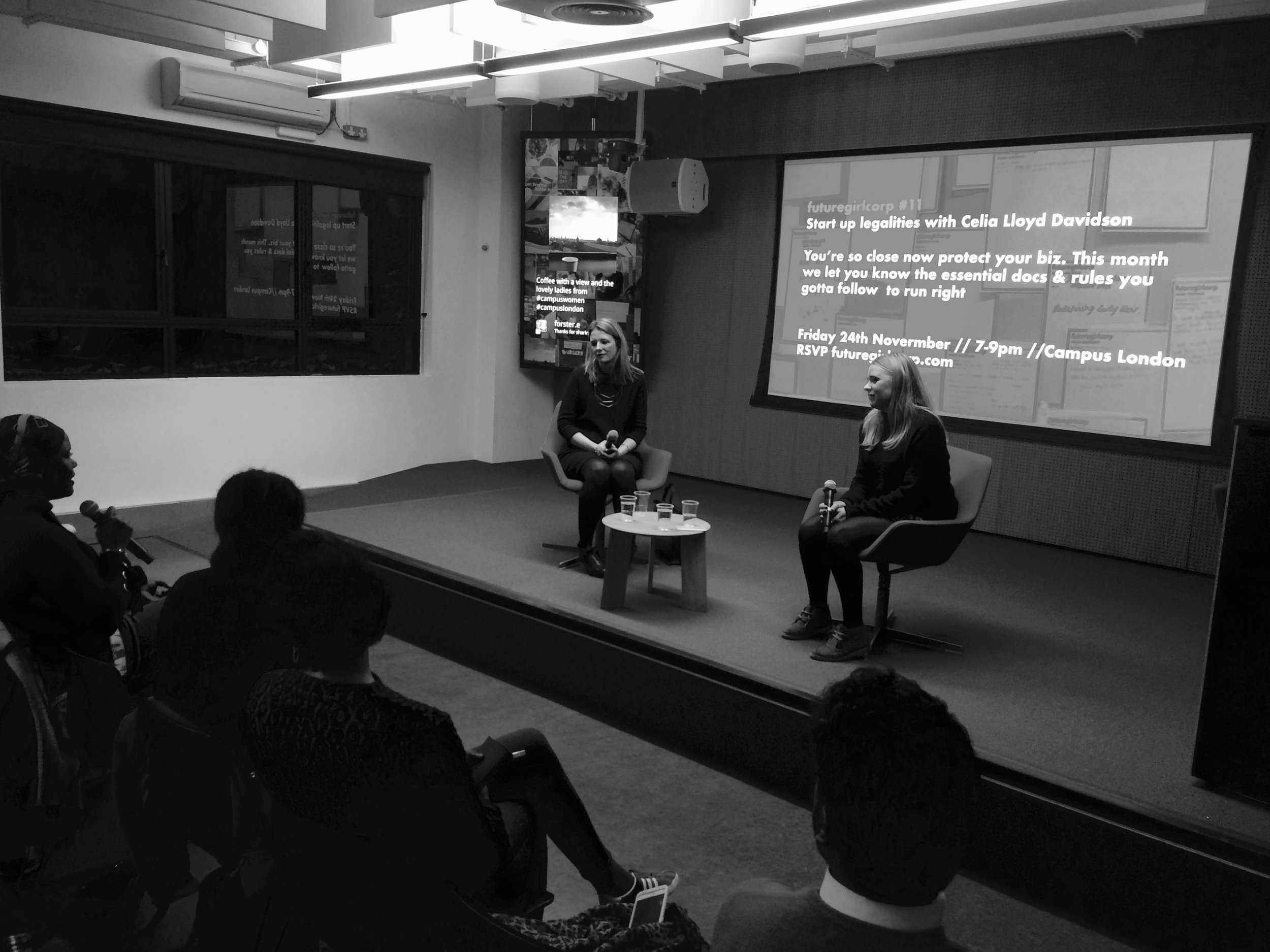Startup Legalities

We know that navigating the legal minefield of setting up your startup can seem daunting. That's why we asked Celia Lloyd Davidson, an Intellectual Property specialist and head of the UK Art Law practice at Withers LLP, and Amy Thomson, founder of Moody, to run through the basics of startup legalities at last month's FGC panel. If you missed it, here are the 10 things to watch out for.
1. The Infrastructure...
Figure out who exactly is going to be involved in your business, what their roles are, what expectations you'll have of each other and how you'll be financing everything, before putting a legal framework in place. When you come to registering a limited company, you need to know who is actually going to be on that document so outlining those involved with your company is a good exercise to do before.
2. The Key Documents...
When you have a company, one of the things you have to think about is whether you’re going to use bespoke versions of shareholders agreements and articles of association. That’s when it’s super important to think about how people are interacting with each other, who is will have majority voting rights and how you want the business to run day-to-day. Although it might seem a bit unnecessary in the beginning, it's easier to work it all out then rather than struggling through awkward discussions around corporate divorce and finances later.
“If you’re thinking about registering a company, you should work out how complicated your IP, products and services are because if you have lots of different types of customers or people who are going to be involved in the formation of your business, you should have bespoke documents. You need to make sure you’re putting really clear frameworks around who those people are and how you’re engaging with them.” - Amy Thomson, Moody.
Otherwise, Companies House has loads of documents that might be helpful to you. Most legal offices are happy to run through basic documents with people, especially if they see you as someone as who is growing.
KEY DOCUMENTS TO HAVE:
- Shareholder’s Agreement
- Articles of Association
- Employee Contracts (even if you’re using freelancers or contractors)
3. Sorting Your IP...
Intellectual property (IP) constitutes of trademarks, patents, copyrights and design rights, [confidentiality and data protection are not IP but usually get lumped together].
Patents: Only applicable to technological inventions. They are common in businesses working with formulas or scientific innovation. If you’ve got a tech innovative company or using specific formulas in beauty, it might be worth looking into patenting. They are more expensive to get and take longer to be processed because they give you an economic monopoly over that invention.
Trademarks: A means of protecting your brand. If you use a lawyer, it generally ranges from £1500 - £2000, depending on your application. If you can allocate budget, trademarks are a key IP priority. You can stagger the process to help with the budget, e.g. buying a UK only trademark, which is a bit cheaper. You’ve got a 6 months priority window, where you can roll it out to other countries, so if you buy it in the UK first and in that time you get further investment, you could then easily expand the trademark to other countries and it will backdate to the filing date of your original trademark. But be warned that if your trademark is more than 5 years old and you’re not using it, it’s vulnerable to cancellation by other people. So you should always register it when you’re actually going to use it. If you don’t register a trademark, it doesn’t mean to don’t have any rights over your brand but it just means it’s harder to enforce them unto other people.
Design Rights: Function in a similar way to trademarks.
Copyright: Everything you’re producing, from your code to your website, every text or email you send, your business plan, etc… If you’ve got people doing anything with you then you need to be assigning their copyright to you, otherwise, they will own it. Whoever creates something owns that creation, unless they transfer it e.g. if working with a photographer, the person taking the photo owns the copyright, even if you paid for it. It’s not the cash transaction that gives you the legal right. Often a lot of people would be happy to sign a short letter, confirming the arrangements. Even if you’re friends, make sure to have something in writing - it doesn’t have to be aggressive but it just protects both of you in the long run. Be warned, there are moral rights in anything that is copyright protected e.g. the right to be named as the artist, the right to object to the derogatory treatment of your work, etc...
4. Getting a Lawyer...
Whether through word of mouth or just coming across a company that you like the look of, you should always vet potential solicitors. It's about finding the right person for you and your company, someone you trust to have your back. Meet up with them and have an interview to scope them out. You should want to work with your lawyer so as to ensure the building of a positive and long-term relationship as you grow.
5. Going Live: Engaging with Customers & Managing Transaction Processes...
- Make sure you have T&Cs on your website.
- As well as a cookie policy.
- Research whether your brand name is available as a domain before falling in love with it. You might have your name available but there might also be several variants of the name e.g. a dom com. It’s difficult to get the domain from someone later so purchase as many variants of your name when you’re starting out. Remember domains in themselves are not IP rights, they are traditional property rights, therefore you only have the right to be named as the owner and registrant.
6. The Legal Changes in Europe...
Every business will be impacted differently by the changes that are coming to the UK. The ICO (Information Commissioner’s Office) website is an excellent source for updates. They have a free line that you can call with any questions, no matter the size of your business.
7. External Investment...
At this stage, there will be term sheets of agreements and you would go through a due diligence process, where investors are researching you, so it's important that you speak to a corporate lawyer.
Investors will want to know all your IP information to make sure you’ve registered the brand. Be mindful of registering the trademark in your name personally because it’s really the company that will be using it. If you do register the trademark in your name, as is quite often in fashion, ask a lawyer to create a document stipulating conditions of use. Otherwise, if you sell the company years down the line, they’ll keep using your name.
8. The Confidentiality...
If you don’t have a confidentiality agreement in place, be careful about pitching ideas to anyone. It's normal business practice to ask someone to sign a confidentiality agreement before disclosing information to them. Ensure you’re validating your idea but when you get to the point that you’re raising investment or scaling the business, it’s about knowing what are the potential risks associated to the exposure you might have in that environment. If in doubt, call a friendly solicitor for advice.
In terms of data, it’s hugely important that you’re very strict with who has access to that data, whether freelancers or permanent staff, and that they are signing those confidentiality agreements.
"If you’re starting out and a lot of your assets are creative or confidentiality is really important to you, if people aren’t under contract, it’s quite hard to make sure that they comply with your terms after they’ve left." - Celia Lloyd Davidson, Withers LLP.
9. Write Everything Down...
When negotiating terms with cofounders, freelancers or suppliers, make sure you are being clear about your expectations of that working relationship, and that you understand theirs too. Even if you put in an email, be clear about how you work together so as to prevent a fall out later. You could even flag up key points from the agreement document within the email to get it on their radar.
10. Always Plan Ahead...
A lot of law is about protecting yourself for the future. You should be talking with your lawyer about where you’re company is going in order to allow them to prepare legally for those plans. If you’re registering a trademark, it shouldn’t be just about what you are doing now, it should be about what are you doing in the next 5 years and where?





